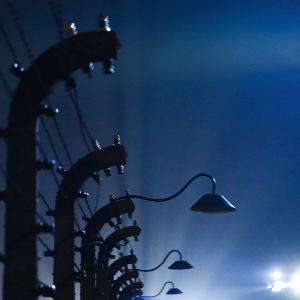How can the memory of the Holocaust be kept alive?
7 Dec 2020
Memorial culture - a future issue: Statements from Michael Brenner, Kim Wünschmann und Mirjam Zadoff
7 Dec 2020
Memorial culture - a future issue: Statements from Michael Brenner, Kim Wünschmann und Mirjam Zadoff

KL Auschwitz, the largest of the German Nazi concentration camps and extermination centers | © Beata Zawrzel/NurPhoto via Getty Images
Kim Wünschmann, Research Fellow at the Department for Modern and Contemporary History at LMU and Coordinator of the LMU’s cooperation with the Center for Holocaust Studies at the Leibniz Institute for Contemporary History (IfZ): “Eye-witnesses are an indispensable component of Holocaust memorial culture, and their role in education is key. While today we still have the privilege of listening to survivors and putting questions to them in person, we need to think about ways to ensure that the power of their testimonies is preserved for future generations. Digital technologies and new forms of visual storytelling can help us make collections of documentary material, including sound recordings and films, more accessible, for example as interactive 3D projections of eye-witness accounts. I am currently working on a graphic history for young readers – and I strongly believe that it is important to continue the conversation and talk to the children and grandchildren of survivors, in order to learn more about how the Holocaust affected family lives and how memories are transmitted. Intergenerational lines of communication help to keep history alive.”
Michael Brenner, Chair of Jewish History and Culture at LMU: “Has the memory of the Holocaust acquired a new urgency recently? It has always had an immediate and direct relevance, and it is now no less urgent than it ever was. For a long time, verbal expressions of antisemitism, even violent acts directed against Jews have been dismissed as the outdated reflexes of individuals who will ‘never learn’, as the saying goes. But racism and antisemitism have not disappeared. Indeed, the recent increase in overtly political right-wing extremism demonstrates that they have taken on a new quality. When one of the leaders of the AfD explicitly belittles the significance of the Holocaust for German history, such views become that much more acceptable. Not only are they now represented in Federal and State parliaments, they are brazenly demonstrated there. Recall that when Charlotte Knobloch, the President of the Jewish Community of Munich and Upper Bavaria, was invited to speak in the Bavarian State Parliament early last year, some members of the AfD’s parliamentary party staged a walkout. These developments are very worrying.”
Mirjam Zadoff, Director of the NS Documentation Center, Munich: “What forms will memory culture take in 10 or 20 years from now? Which political and cultural actors will take on the task of insisting on its continuing significance – in Germany, a society that is home to (post)migrants from so many different backgrounds? Therefor we hope to reach those who have no direct link with the history of the Holocaust, because their ancestors had not lived in Germany. Yet, we also have to make a continuous effort to arouse interest among young people whose family did live here and were part of German society. For many of them the biographical connection with the past has broken off, because their grandparents or great-grandparents have either died or are too young to tell a story. How can we reach a consensus that brings diverse groups together, including people who themselves have experienced violence in their home countries and have their own stories to share? If we as a global society wish to learn from the German experience and the Holocaust, we need to discuss German memory culture in transnational context, and teach German history in comparative perspective – in order to understand its true relevance.”